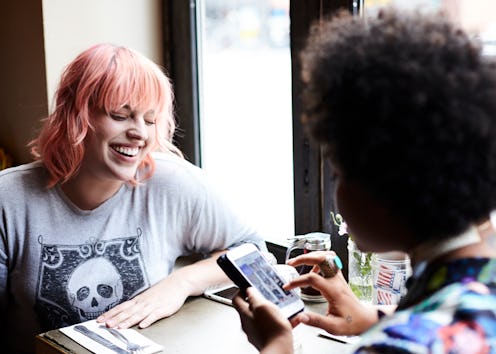Life
Here's Why You Might Not Want To Use Payment Apps If You Split The Bill On A Date

Finding a way to split the bill on a date can be really awkward — especially in the early stages of dating. Talking about money isn't easy anyway, but it can get more complicated if one of you orders way more or if one of you is more strapped for cash than the other. One way that a lot of us combat that awkwardness is with payment apps — we might send each other our half via an app, rather than getting separate checks or dealing with an actual monetary exchange at the table. But a new study shows that these sorts of apps might actually be working against you in your dating life.
The Wall Street Journal ran a series of experiments looking at just this issue — and found that payment apps might be doing us a disservice. They asked participants to give their impressions of two different people, using these people's transaction histories with a friend. One person had sent round amounts — transferring their friends amounts like $15 or $20, while the other had done exact amounts, like $13.44 or $20.70. Even though the total amount of money they transferred was the same, a huge 81 percent of people said they'd rather be friends with the person who used round amounts. They said that being too exact made what should be friendship feel more like a business transaction. And it can seem petty — but using payment apps encourages this kind of exact transaction.
They had the same results when it came to offering time — they had participants look at "potential matches", one of whom had offered two hours to help a friend move, while another had offered one hour and 56 minutes — and yet another still had offered two hours and four minutes. The interesting part was that people still preferred the person offering a round amount of time, even though it was less than the person offering two hours and four minutes. They even found the same thing in relationships where one person is anal about keeping track of every penny spent on groceries and errands — their partner was less satisfied than those who were more relaxed.
"We were surprised that even generosity can come across as petty. For instance, getting a $5.15 gift card is worse than getting a $5.00 gift card, even though the former is, objectively speaking, more," Tami Kim, an assistant professor of marketing at the Darden School of Business who worked on the research, tells Bustle. "When it comes to money, couples may think that being exact — and making sure that there is nothing owed between them — is a way to maintain the quality of their relationships. But, our research suggests that this kind of behavior comes with a risk: making the relationship feel transactional (e.g., akin to what your interactions may look like with your accountant or a salesperson). Rather, in your personal relationships — with your friends, family, and significant others — leaving some room for reciprocity by not being too precise all the time may be a good way to preserve these relationships." It may be best to just keep it simple — but that's not always easy to do on a date.
So What's The Best Way To Split The Bill?
Money is going to come up a lot in relationships, even if you're fairly early on in dating. In fact, it's a good way to feel out if you're both compatible on that front. If you're both cool with alternating who pays or splitting down the middle or only paying for what you ate, it's a good sign you're on the same page about money.
"This has much more to do with tradition and values than money," Priya Malani, co-founder of Stash Wealth tells Bustle. "Quite frankly, if you guys aren't comfortable or are having trouble figuring out how to handle splitting the check, you can almost always expect to have differences on much larger, perhaps more important money conversations. When we start having conversations like this with our clients, it leads to larger conversations and the first step is in deciding if they see themselves as a 'team' and want to work toward their financial future together. Having the right mindset around finances and a shared picture of what kind of future you want (big stuff, I know) can help to eliminate smaller issues like who earns more, who has more debt and who should pay for dinner!"
If you're further along in the relationship you may want to think about combining your finances a little more so you don't have to deal with the issue so much. But, as Malani says, it'll depend that'll depend on how serious your relationship is.
"When in a serious relationship, we encourage couples to move away from a 50/50 split or even a proportional split based on income," Malani says. "Instead, we advise that money spent on everything from bills to entertainment come from a pooled account (i.e. a joint checking account) where both paychecks direct deposit. Shifting to a team mindset helps you move away from smaller (less significant) money conversations and focus on larger (more impactful) ones instead."
From the beginning stages of a relationship to long-term partnerships, money comes up again and again. So, bottom line — what should you do early on? Well, leave the ball on in their court. "Always ask for the exact amount and leave it up to the person who's paying to decide if they'd like to round or not," Malani says.
Splitting the bill can be tricky early on, so maybe a payment app isn't the best way. Or, if you do use one, round number and a cheeky emoji might help soften the blow. After all, it's not a business exchange.